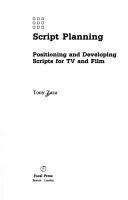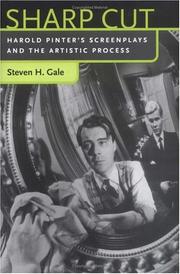| Listing 1 - 10 of 195 | << page >> |
Sort by
|
Book
ISBN: 303048713X 3030487121 Year: 2021 Publisher: Cham, Switzerland : Springer : Palgrave Macmillan,
Abstract | Keywords | Export | Availability | Bookmark
 Loading...
Loading...Choose an application
- Reference Manager
- EndNote
- RefWorks (Direct export to RefWorks)
Motion picture plays --- Technique. --- Motion picture authorship

ISBN: 0240801210 Year: 1993 Publisher: London Focal press
Abstract | Keywords | Export | Availability | Bookmark
 Loading...
Loading...Choose an application
- Reference Manager
- EndNote
- RefWorks (Direct export to RefWorks)
Motion picture authorship --- Motion picture plays --- Marketing
Book
ISBN: 1135209944 128370885X 0203699416 1135209952 9781135209957 Year: 1992 Publisher: New York : Routledge,
Abstract | Keywords | Export | Availability | Bookmark
 Loading...
Loading...Choose an application
- Reference Manager
- EndNote
- RefWorks (Direct export to RefWorks)
Framer Framed brings together for the first time the scripts and detailed visuals of three of Trinh Minh-ha's provocative films: Reassemblage, Naked Spaces--Living is Round, and Surname Viet Given Name Nam.
Book
ISBN: 0941188078 Year: 1988 Publisher: Studio City Wiese
Abstract | Keywords | Export | Availability | Bookmark
 Loading...
Loading...Choose an application
- Reference Manager
- EndNote
- RefWorks (Direct export to RefWorks)
Motion picture authorship --- Motion picture plays --- Technique
Book
ISBN: 0820351148 9780820351148 9780820351131 082035113X Year: 2017 Publisher: Athens University of Georgia Press
Abstract | Keywords | Export | Availability | Bookmark
 Loading...
Loading...Choose an application
- Reference Manager
- EndNote
- RefWorks (Direct export to RefWorks)
Faulkner, William, --- Radio and television plays. --- Motion picture plays.
Book
Abstract | Keywords | Export | Availability | Bookmark
 Loading...
Loading...Choose an application
- Reference Manager
- EndNote
- RefWorks (Direct export to RefWorks)
Motion picture plays, German --- Motion pictures --- History and criticism --- History
Book
ISBN: 1474429009 1474421407 147443567X 1474421415 1474421393 9781474435673 9781474421409 9781474421416 9781474421393 Year: 2022 Publisher: Edinburgh
Abstract | Keywords | Export | Availability | Bookmark
 Loading...
Loading...Choose an application
- Reference Manager
- EndNote
- RefWorks (Direct export to RefWorks)
Based on close readings of texts, Zeina Halabi counters the prevalent reading of late 20th-century Arabic literature as a neoliberal, apolitical, fragmented discourse.
Arabic literature --- Motion picture plays, Arabic --- History and criticism. --- Arabic motion picture plays --- Arabic drama --- 1900-1999

ISBN: 0813147956 9780813147956 9780813122441 081318083X 0813180503 Year: 2003 Publisher: Lexington, Kentucky : The University Press of Kentucky,
Abstract | Keywords | Export | Availability | Bookmark
 Loading...
Loading...Choose an application
- Reference Manager
- EndNote
- RefWorks (Direct export to RefWorks)
Best known as one of the most important playwrights of the twentieth century, Harold Pinter has also written many highly regarded screenplays, including Academy Award-nominated screenplays for The French Lieutenant's Woman and Betrayal, collaborations with English director Joseph Losey, and an unproduced script for the remake of Stanley Kubrick's 1962 adaptation of Lolita. In this definitive study of Pinter's screenplays, Steven H. Gale compares the scripts with their sources and the resulting films, analyzes their stages of development, and shows how Pinter creates unique works of art by extr
Motion picture plays, English --- English motion picture plays --- English drama --- History and criticism. --- Pinter, Harold, --- Bintar, Hārūld, --- Пинтер, Гарольд, --- פינטר, הרולד, --- Pinter, Garolʹd, --- Technique. --- Motion picture plays.
Book
ISBN: 0231549598 9780231549592 9780231191968 0231191960 9780231191975 0231191979 Year: 2019 Publisher: New York, NY
Abstract | Keywords | Export | Availability | Bookmark
 Loading...
Loading...Choose an application
- Reference Manager
- EndNote
- RefWorks (Direct export to RefWorks)
Most films rely on a script developed in pre-production. Yet beginning in the 1950s and continuing through the recent mumblecore movement, key independent filmmakers have broken with the traditional screenplay. Instead, they have turned to new approaches to scripting that allow for more complex characterization and shift the emphasis from the page to performance.In Rewriting Indie Cinema, J. J. Murphy explores these alternative forms of scripting and how they have shaped American film from the 1950s to the present. He traces a strain of indie cinema that used improvisation and psychodrama, a therapeutic form of improvised acting based on a performer's own life experiences. Murphy begins in the 1950s and 1960s with John Cassavetes, Shirley Clarke, Barbara Loden, Andy Warhol, Norman Mailer, William Greaves, and other independent directors who sought to create a new type of narrative cinema. In the twenty-first century, filmmakers such as Gus Van Sant, the Safdie brothers, Joe Swanberg, and Sean Baker developed similar strategies, sometimes benefitting from the freedom of digital technology. In reading key films and analyzing their techniques, Rewriting Indie Cinema demonstrates how divergence from the script has blurred the divide between fiction and nonfiction. Showing the ways in which filmmakers have striven to capture the subtleties of everyday behavior, Murphy provides a new history of American indie filmmaking and how it challenges Hollywood industrial practices.
Independent films --- Motion picture plays, American --- Indie films --- Motion pictures --- History and criticism.
Book
ISBN: 1477311092 Year: 2016 Publisher: Austin, Texas : University of Texas Press,
Abstract | Keywords | Export | Availability | Bookmark
 Loading...
Loading...Choose an application
- Reference Manager
- EndNote
- RefWorks (Direct export to RefWorks)
Much of the writing in film studies published today can be understood as genre criticism, broadly speaking. And even before film studies emerged as an academic discipline in the 1970s, cultural observers within and beyond the academy were writing about genre films and making fascinating attempts to understand their conventions and how they speak to, for, and about the culture that produces them. While this early writing on genre film was often unsystematic, impressionistic, journalistic, and judgmental, it nonetheless produced insights that remain relevant and valuable today. Notions of Genre gathers the most important early writing on film genre and genre films published between 1945 and 1969. It includes articles by such notable critics as Susan Sontag, Dwight Macdonald, Siegfried Kracauer, James Agee, André Bazin, Robert Warshow, and Claude Chabrol, as well as essays by scholars in academic disciplines such as history, sociology, and theater. Their writings address major issues in genre studies, including definition, representation, ideology, audiences, and industry practices, across genres ranging from comedy and westerns to horror, science fiction, fantasy, gangster films, and thrillers. The only single-volume source for this early writing on genre films, Notions of Genre will be an invaluable resource for scholars and students of film genre, film history, film theory, cultural studies, and popular culture.
Film genres. --- Motion picture plays --- Motion picture authorship. --- History and criticism.
| Listing 1 - 10 of 195 | << page >> |
Sort by
|

 Search
Search Feedback
Feedback About UniCat
About UniCat  Help
Help News
News